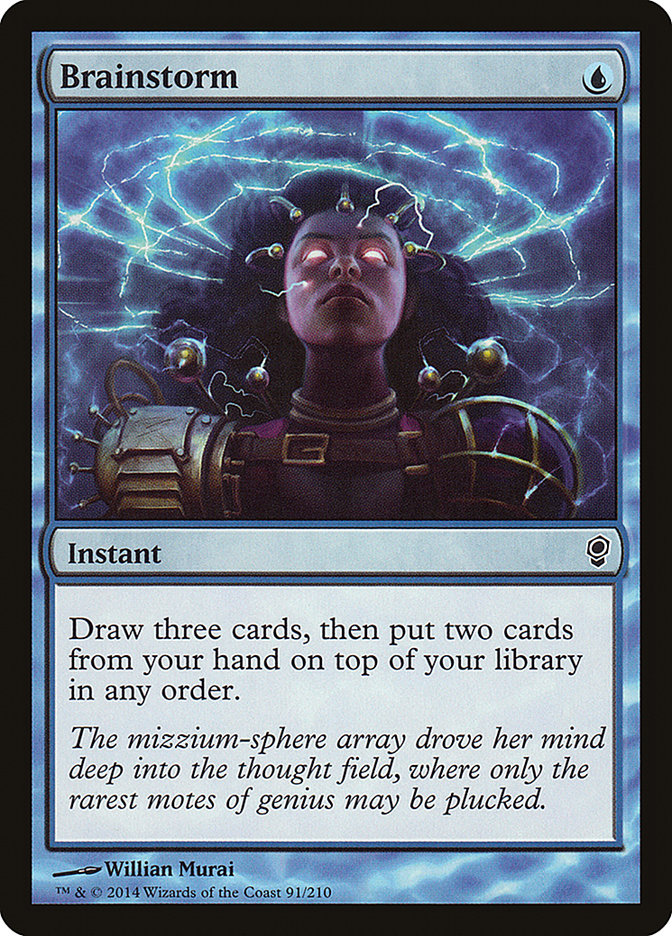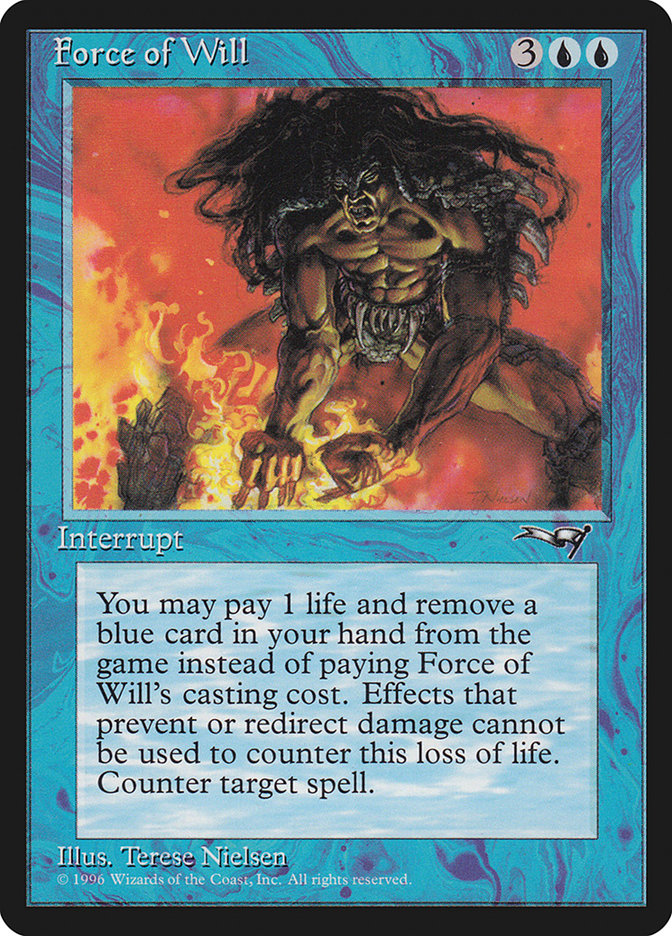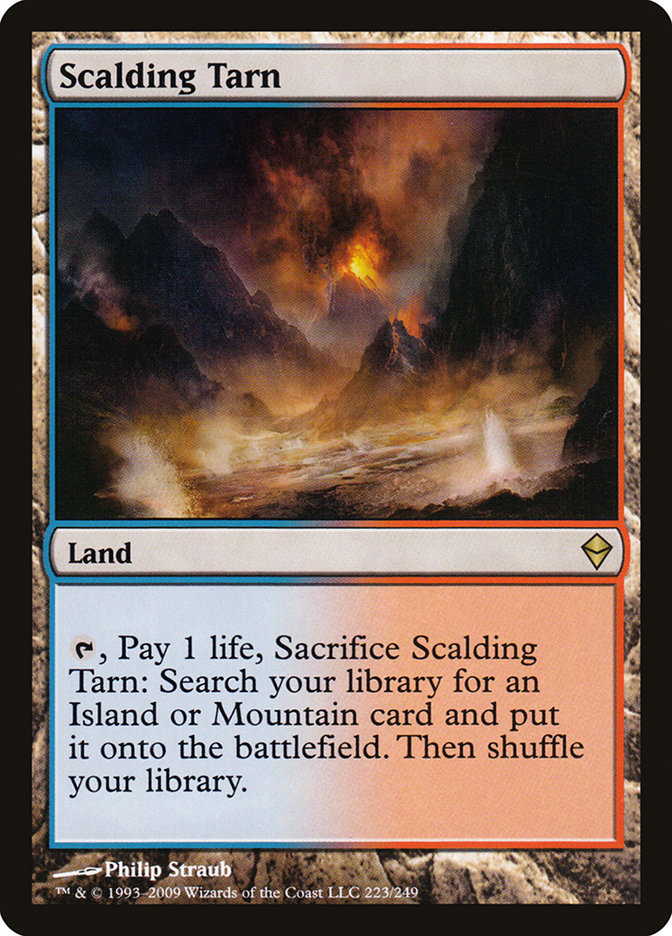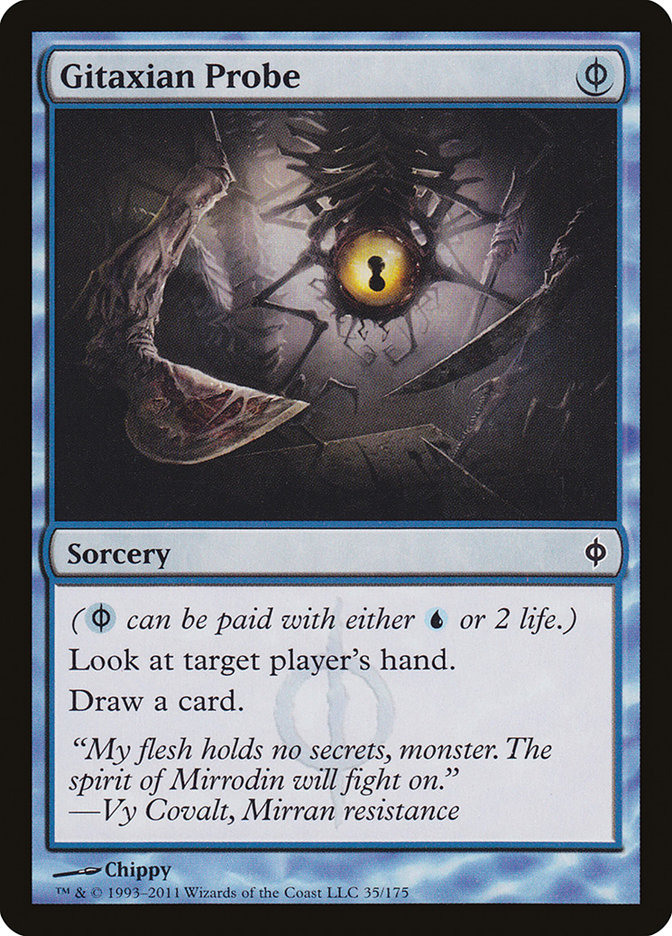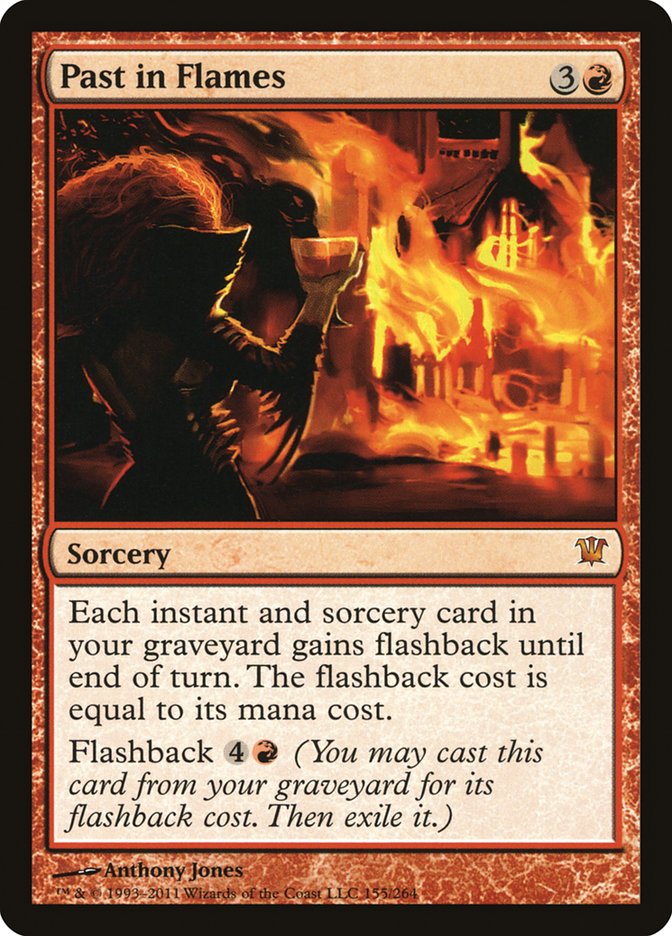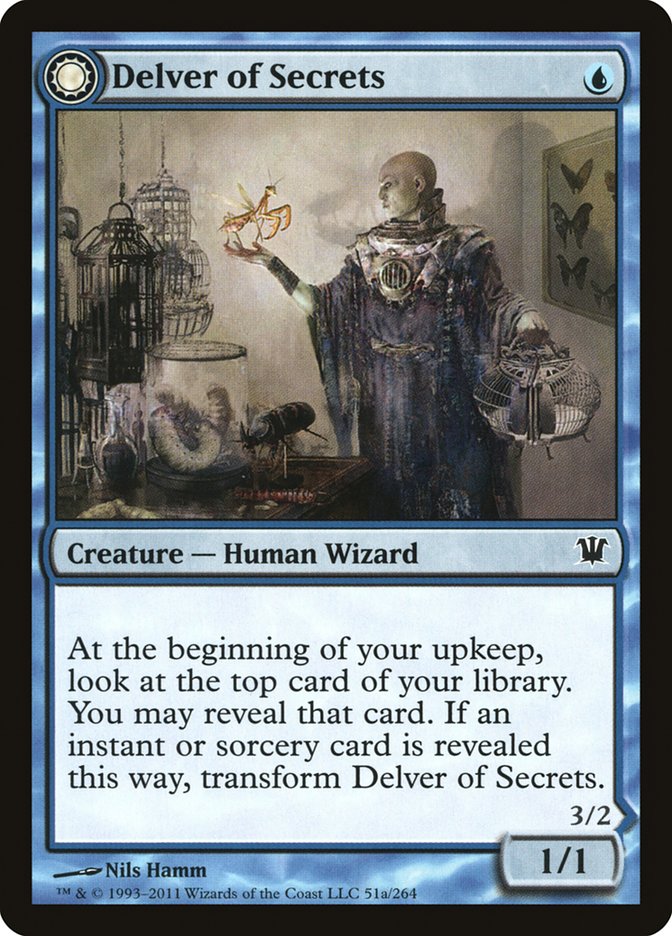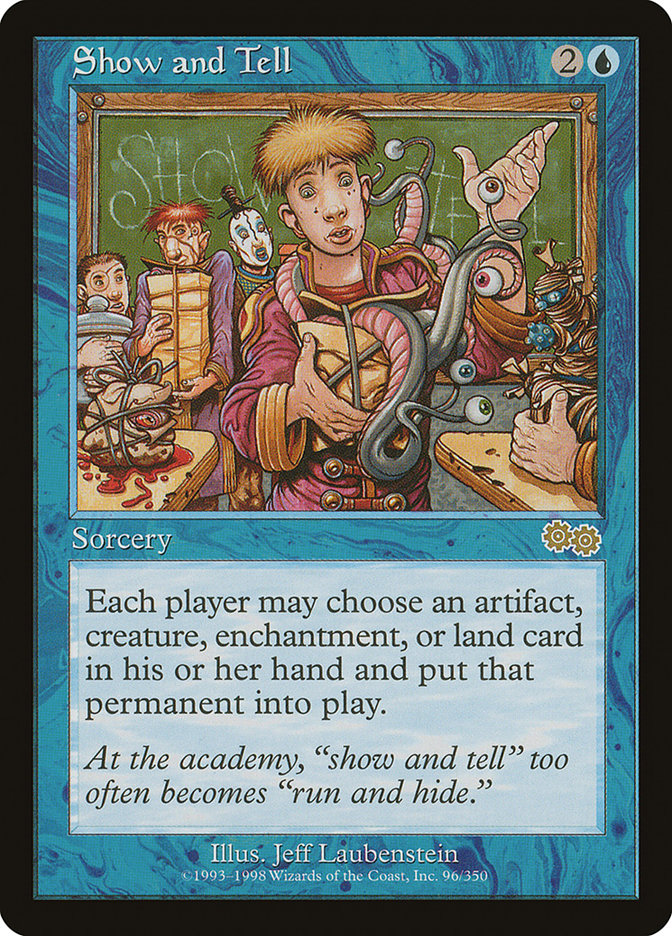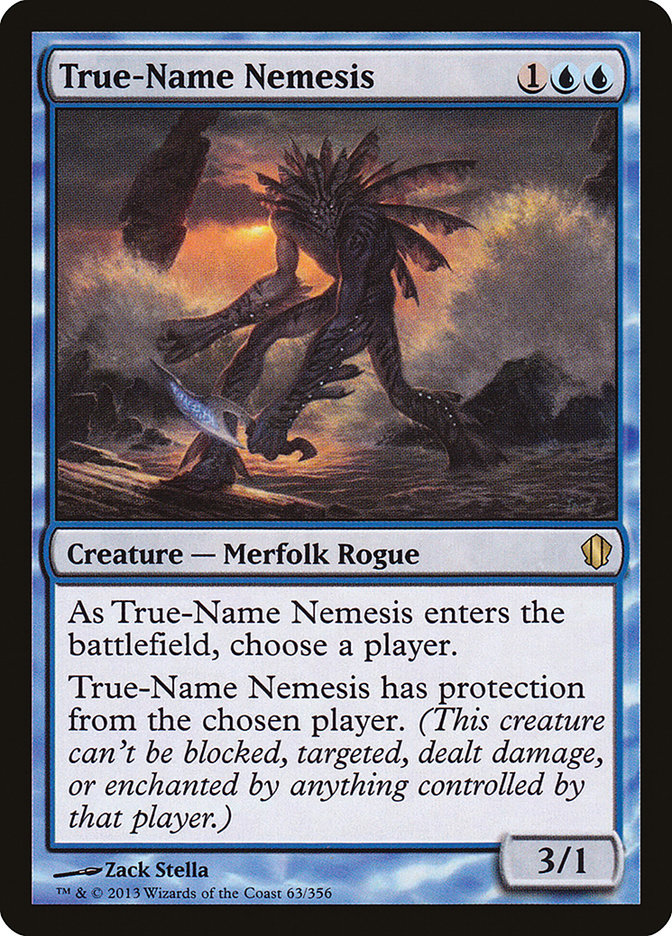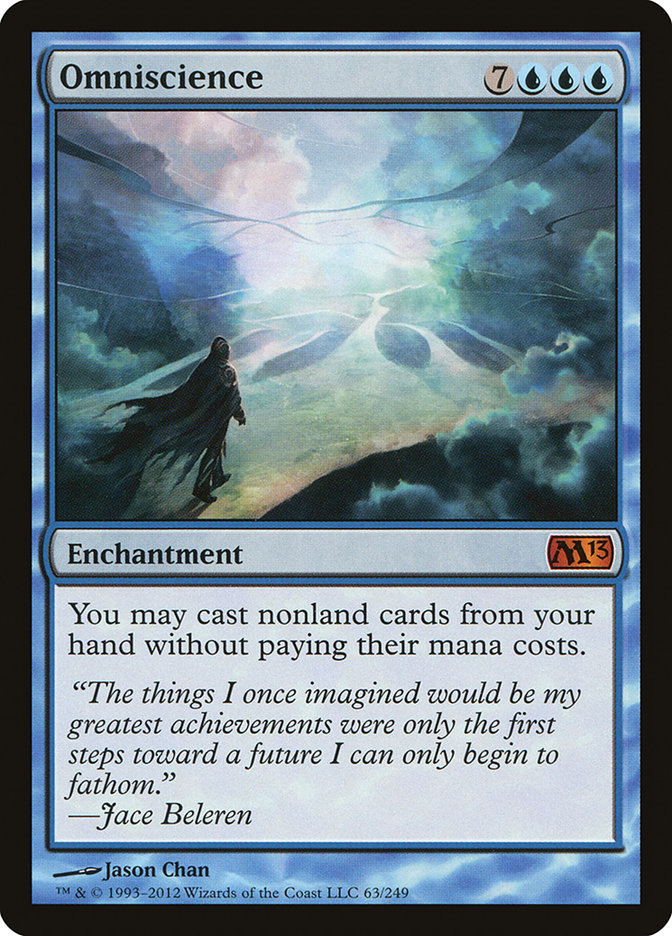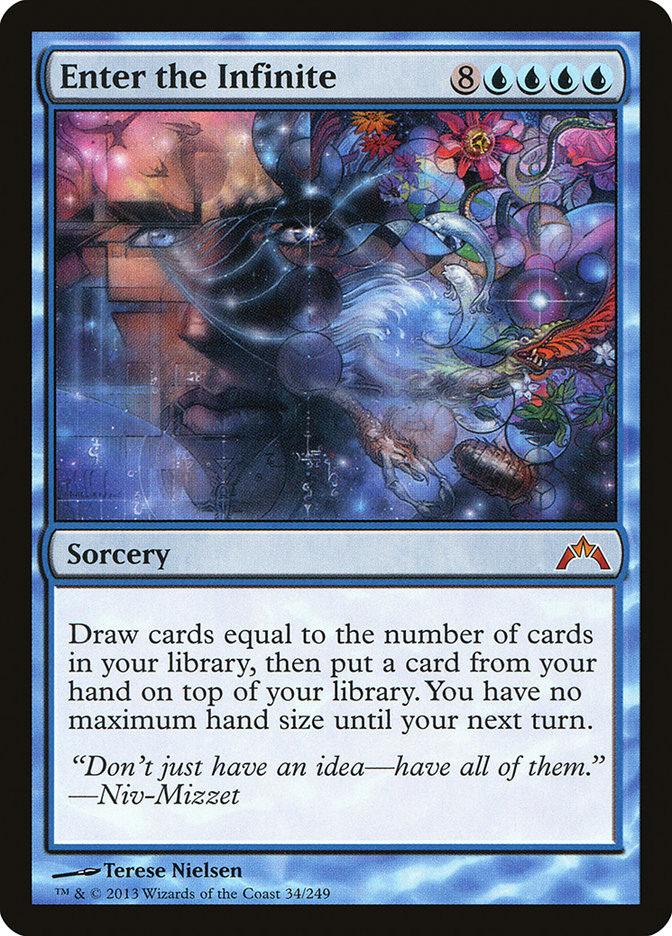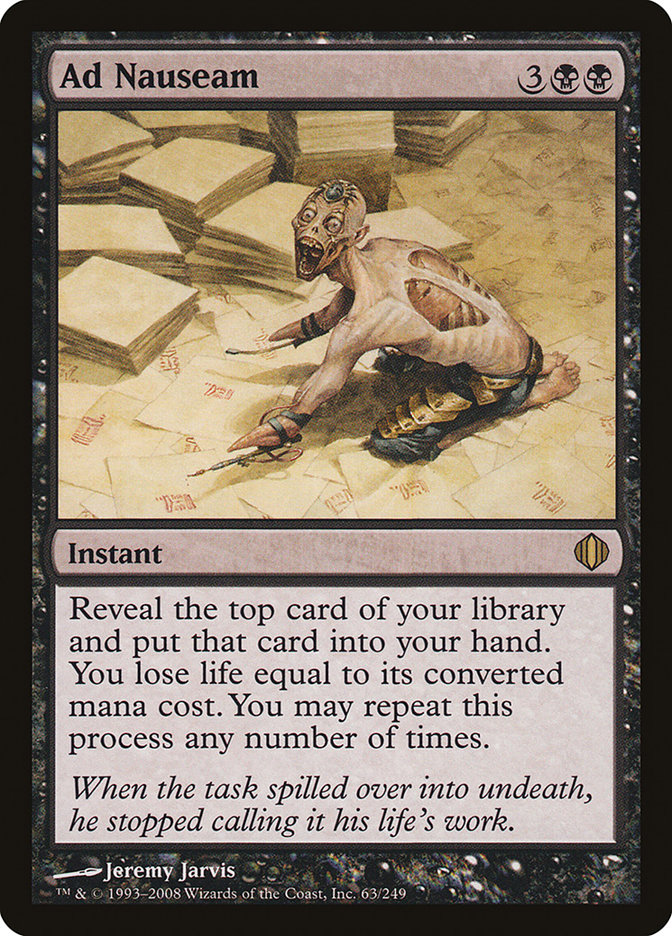Today’s article will be a bit more self-indulgent than what you’re usually used to because I want to talk some Legacy cards I particularly love or hate. As
you’ve probably realized, I hold pretty strong opinions of what I consider a fun game experience, what I’d like Magic to look like, and what really
disrupts my enjoyment of the game. It should be obvious that those are quite personal and subjective, not something you can argue over with pure cold logic
and reason.
Yet that’s what Magic is about in the end – personal player experience. It’s why we don’t get four mana Wrath of Gods in Standard anymore, why Counterspell
and even Mana Leak seem soft-banned in development for future Magic sets, why we get super powerful midrange value creatures, ridiculous fatties that
dominate the game for high mana costs, and most likely why Mind Twist and Black Vise still reside on the Legacy banned list. Simply put, there are a lot of
players out there that love (or hate) those things, and WotC is quite conscious that players buy more packs if they enjoy the gameplay of the cards that
they open up.
However, while those players make up a large part of the player population among casual players, newer players, and Standard Constructed players, the
Eternal formats are the place where those of us that enjoy different play patterns than the midrange grind and the strongly board-focused play R&D has
been pushing in Standard legal sets for a number of years now can live out our old-school expectations we want from a game of Magic.
Note, that isn’t meant to say there aren’t players that would prefer to play that kind of game in Eternal formats or that there shouldn’t be options for
them to do so in Legacy (not Vintage–in my opinion, if you decide to play Vintage, you can reasonably be expected to know that casting a Siege Rhino isn’t
going to cut it. Vintage is about doing truly broken things basically by nature due to the restricted list, and doing them is a huge part of what makes the
format so enticing). What I mean is that Legacy is meant to be about more than board based play and so-called fair Magic, that it essentially
exists for players to do all the cutthroat things they can’t in other formats without being forced to expect trying to out-broken one another in every
single match.
So, given that I want to talk about what I like and dislike in Magic, but don’t want to make this a straight up, purely abstract rant, what I’ve decided to
do today is to talk about some of the Legacy legal cards that exemplify the kind of gameplay I enjoy, cards that I love to play with or see in action and
their counterpoints, and cards that I could rage about for hours because the games they lead to annoy me to no end.
Love
Well, let’s start with the one you all expected to be here, the poster child for causing heated flamefests in B&R threads for a little while now, the
card a lot of players cite as the reason they enjoy Legacy so much, and that others consider oppressive and totally overpowered.*
*In spite of this introduction, this isn’t about the whole B&R issue. If I wanted to talk about that, I would do so directly.
So why do I love Brainstorm? Well, there are multiple reasons. First I love drawing cards and fiddling around with my library. Necropotence is one of my
all-time favorite cards – I only wish it didn’t work so well at setting up game ending combos the turn after it’s played – and my preferred way to win the
game has long been to draw so many cards that it really doesn’t matter what my opponent is up to.
I also love all kinds of tutors – once again, it’d be nice if they didn’t lend themselves so well towards just winning on the spot so we could have more of
them legal. I mention this because of the second and most important reason I love Brainstorm so much – I just love consistency. I want games in which both
players are able to implement their gameplans at full efficiency, where the game is a clash of the titans with both decks firing on all cylinders and
throwing their punches as they’re meant to be thrown. I don’t want to lose because my opponent drew a bunch of powerful cards and I couldn’t find answers,
and I don’t want to win because my opponent rattled of five lands in a row and never made a meaningful play all game. Brainstorm is far from the only tool
Magic gives us access to to help make that happen as often as possible, but it surely is one of the most efficient ones (probably the most efficient one
for a lot of decks).
The only problem I have with Brainstorm is that not everybody gets to play it. The effect is undoubtedly extremely powerful and leads to a lot of
different archetypes touching blue to get access to it, but I really don’t care too much about that. What colors are in my (or my opponent’s) deck really
doesn’t matter much to me. However, there are enough decks that simply can’t play Brainstorm because the cards they’re built around just require too many
colors already or otherwise put too much of a strain on their manabase to reasonably incorporate it, and as a result they sometimes lack access to
similarly efficient draw-fixing tools.
While that doesn’t make those decks worse than decks with Brainstorm necessarily, it means they will exhibit a higher failure rate – as in “games in which
their gameplan simply doesn’t come together at all” – and I despise those games. They aren’t games, they’re one person playing and the other looking on
dejectedly. Anything that reduces the chances of that happening is a major plus in my book. Honestly, I’d love it if Wizards just colorshifted Brainstorm
into all the colors for that reason, though that doesn’t seem likely to happen. Giving all the colors some kind of tempo-efficient consistency tool like
Green Sun’s Zenith would already be a huge step in the right direction in my book.
What can I say, I’ve always loved countering spells. I like that nice, safe feeling of sitting back and knowing that whatever my opponent is gonna throw at
me, I’ll be able to deal with it. To me Magic is about the interplay of threats and answers, both players maneuvering for position until one of them can
punch through and land the deadly blow. For this gameplay to unfold, we need effective threats but even more importantly, we need efficient, polyvalent
answers.
There is an old adage that states that “there are no wrong threats, just wrong answers,” and that’s a very true observation. If one player has a threat and
the other doesn’t have an answer, they’re going to win. Given that fact, for an intricate sequence of thrust and counter-thrust to unfold, we need answers
that are as flexible as possible so that the chances of threats being answered are as high as possible. Unconditional, cheap countermagic does exactly that
while still leaving a weakness to be exploited – it’s timing sensitive, often forcing tough decisions on the player wielding it.
Honorable mentions go to cards like Abrupt Decay, Vindicate, Lightning Bolt and Swords to Plowshares for filling similar roles with different restrictions.
I already explained about my love for countermagic in general, but leaving out Force of Will as a card that I love when I think it’s the one thing that
makes Eternal formats even playable seems suspect. I don’t love good old FoW mainly for its gameplay – though I do enjoy it a lot – the main reason for my
adoration is what the threat of Force of Will does to deck construction and gameplay.
It’s definitely possible to build decks that can win on turn 1 quite consistently (just look at Belcher and Oops! All Spells!), and if there’s nothing to
stop you from doing so when you win the die-roll, we make that roll of the dice an actual die roll and allow decks to just push towards speed
because of that. Force of Will, merely by existing and seeing a reasonable amount of play, forces players to include ways to actually fight through
disruption in their combo decks, causing those decks to slow down and turning the game from one of mutual goldfishing back into that dance of threats and
answers I want to experience.
As for gameplay, I love how the existence of interactive free spells – of which FoW is simply the poster child – forces you to never put down your guard in
Legacy. Just because your opponent is tapped out, you can’t suddenly move into auto-pilot mode, you still have to think about what happens when they do
have some piece of interaction. That’s what I want to have to do and why I love Force of Will.
These are so close to the core of the Legacy experience, I nearly forgot to mention them. As I said, I want both players to be able to play the game and
without good, consistent mana, you just don’t get to play. Duals and fetches allow you to play basically as many colors as you want to – unless you’ve
decided to commit to some huge color commitments – while still being able to consistently cast your spells in the vast majority of games without incurring
any game-breaking costs (unless your opponent has decided to specifically punish you for being so greedy).
Gitaxian Probe isn’t something I enjoy so much from an abstract point of view – the reasons I love the cards I’ve discussed so far. In fact, I love the
bluffing and mind game aspect of the game enough to feel somewhat ambivalent about Gitaxian Probe from that perspective. However, playing with Gitaxian
Probe in your deck is such a brilliant experience that I can forgive it that fault.
By taking away hidden information for a turn (and reducing it in upcoming ones) it allows you to turn Magic into a game of pure skill and calculation for a limited time only. I enjoy Magic because it engages my intellect and forces me to think through my options, make and adjust plans, set up
calculated moves to work towards winning the game. Gitaxian Probe allows you to truly calculate instead of guesstimating, to play at least a single turn of
the game with perfect information. Even better though, as soon as your opponent’s next turn rolls around, it allows hidden information to creep back in,
forcing you to estimate what might be going on from a solid base of information. Playing the game with this combination of assured knowledge and some
(growing) portion of uncertainty is just awesome.
I just mentioned how I love to calculate complicated lines, trying to figure out how the different pieces of my hand interact and how I can use them to
turn Past in Flames into a surefire win that doesn’t involve variance; it just exemplifies that type of gameplay to me. I could have mentioned Doomsday
here, but I enjoy the mechanics of Past in Flames more somehow. Something about playing all those spells again from my graveyard just resonates with me on
a visceral level – I probably just played with Yawgmoth’s Will in Vintage too much to not enjoy the experience even in watered down form, I guess.
Note that if there was any reasonable Gifts Ungiven deck in Legacy that played even remotely close to the old Vintage Gifts deck, that card would
definitely have taken up this spot. Thinking through not only your own options, but also having to figure out your opponent’s likely thought processes at
the same time is just the most brilliant experience.
There are a ton of other cards I really enjoy in Legacy (especially some more fringe ones), but if I go over them in detail, I probably wouldn’t be
finished with this article this time next year, so here are a couple of honorable mentions, cards whose gameplay I really enjoy. Not that this list is
meant to be even close to complete:
Argothian Enchantress (and friends): These just feed my love for finding complicated ways to draw a ton of cards.
Life from the Loam: More ridiculous card drawing, this time balanced by the fact that it only “draws” lands. I particularly enjoy how Loam plays out as a
self-fueling engine that requires a solid amount of deckbuilding work to actually do anything productive.
Punishing Fire: I love how there is a way to create a dedicated engine that answers a particular kind of threat by using Grove of the Burnwillows, and the
cute interaction of supercharging Swords to Plowshares is icing on the cake.
Thoughtseize, Duress, and friends: The spot-discard spells deliver a brilliant combination of the flexible answer mechanics I like so much about
Counterspell and combine them with the sweet full information game provided by Gitaxian Probe. That makes for awesome cards in my book.
Hate
Just to be clear: I don’t claim any of these cards are broken enough to need to be banned or anything, I simply think the game would be much more enjoyable
if these had never made it to print.
Delver of Secrets to me represents an aberration of the whole efficient threats and answers dance I look forward to when I sit down to play simply because
he’s too efficient of a threat. The investment you need to make to deploy a Delver is basically as small as it is possible to make in Magic (one
mana and a single card) and your return is a threat that will win the game in short order, meaning you don’t actually have much time to draw into answers
if you don’t have any already.
Not only that, the answers are actually surprisingly limited given the whole “it dies to any removal spell” argument many players are fond of. Yes, yes it
does. It also dies to just about nothing else. It’s really hard to counter or discard because it’s so cheap and it gains flying–dealing with it through
creature combat is actually pretty hard to do, the next cheapest decent flying creature good enough to play I can think of right now is Vendilion Clique at
three mana. So a lot of the time we’re looking at “removal or bust” as far as answering Delver is concerned.
Add to that the fact that Delver’s quality is exceedingly dependent on variance – none of the above applies if it doesn’t flip, which is a lot like saying
you’re flipping coins to see if the card is great or terrible this game – and Delver basically feels like an almost free “hey nice, I mise’d you” button.
That’s not the kind of card I enjoy.
Speaking of mising people, this is the other huge offender in that context. I really don’t have a problem with broken things happening. If you Belcher me
on turn 1, I’ll take it in good grace (not that I’ll particularly like it). If you find some convoluted line to play through my Counterbalance and double
counterspell to Tendrils me anyway, I’ll congratulate you. What I find so annoying about Show and Tell isn’t how good it is, it’s how easy it is.
First, when your gameplan is “resolve spell A, win,” there really isn’t much interaction going on, not much to think about. The whole game becomes “mustn’t
let you resolve A.” There are no cards with variable value, nothing to try and figure out. In a more usual two-card combo deck, at least you have two
points of interaction to attack it – the two pieces of the combo, be it Entomb and Reanimate, Painter’s Servant, and Grindstone or whatever other two cards
you want to combine to end the game. Show and Tell says: one spell is all that matters and that’s all there is to this game. Boooring.
Even more annoying to me, however, is the lack of commitment Show and Tell engenders. First, your so-called combo really is just “random ridiculous card B”
and “card that puts B into play.” How does that even count as a combo? It’s just finding something so dumb they made it too expensive to cast and a way to
cheat that casting cost. Second and more importantly, because of the whole “one spell resolving is all that matters thing,” you can just jam Show and Tells
without much thought and win a ton of games anyway. There is no reason to look for openings, nothing to try and play around because all you invest when you
try to go off is a single card. Your second combo piece still sits nice and pretty in your hand, waiting for you to try and go off again once you find your
next Show and Tell. Jamming the combo prematurely has basically no higher cost than playing whatever other threat a deck could be playing.
Doing broken stuff is fine. I’d like it to come with a real cost though, one higher than “you need to put your combo pieces into your deck.” If your combo
is stopped, you should feel punished not shrug it off easily.
Well, I personally really haven’t had much of a problem with this card because of the types of decks I enjoy to play, ones that usually don’t have (many)
creatures. Just seeing this in action on coverage or on the table next to me usually is enough to make me want to moan in frustration though, so I can
imagine how much worse the actual player facing it is feeling.
Simply put, True-Name Nemesis takes combat and makes it as interactive as the stack is in your typical Portal game (no instants). If a player resolves
True-Name Nemesis, their opponent either has a quite specific type of answer to kill it, or the players that signed up for playing a game where the
interaction was going to take place on the board and during the combat step suddenly don’t get to do so any more.
Typically, True-Name Nemesis works like this. Either you’re behind on the board, in which case you get an indestructible three power wall that is immune to
most removal spells to shut down most attacking possibilities given the typical size of (hardcast) creatures in Legacy, or you’re ahead on the board/damage
race and you get an unblockable, untargetable three power attacker that you can even give ridiculous equipment like Umezawa’s Jitte. All that, and there’s
also the mondo combo of equipping it with Batterskull to allow it to play both roles at the same time. I’m not sure who thought about the gameplay for this
card, but they should really have thought again.
My hatred for these two actually doesn’t have much to do with gameplay itself. If you commit to trying to assemble a three-card combo and can pull that
off, I’m fine with you winning the game in short order. They disgust me mainly for design philosophy reasons. Once upon a time, two of the coolest things
you could do in Magic – and that many players jumped through quite ridiculous hoops to achieve – were having access to infinite mana or drawing your whole
deck at will. Putting these effects on cards that just ask you to pay a lot of mana for them is not only lazy design, but damages the feeling of what’s
epic in Magic at its core. Not much more to say, really.
I assume you’re rather surprised to see a card that I habitually play with on the hate part of this list, huh? Well, just because a card is good in a deck
I like doesn’t mean I have to like the card. Ad Nauseam has the same stupid “one spell and you’re dead” effect Show and Tell has, just in a different deck
(Storm), it’s high variance due to all the flipping, and if drawn actually requires very little investment (usually something simple like just a Dark
Ritual).
I’ll admit I don’t hate this as much as the other cards on this list because it at least is somewhat conditional – attacking your life total pretty
efficiently turns it off, it does at least require a little extra-investment in both deckbuilding (quite a lot here, actually), and being cast limits
itself how often it’ll actually turn up in its most stupid form (naturally drawn) because of how terrible it is with extra copies of itself in your
library. You also have to be able to correctly understand what the cards you flip allow you to do so far to make it work, so there really are a lot of
mitigating circumstances.
That being said, Storm is a deck that I enjoy because it’s built around the idea that you maneuver for long enough to (hopefully) ensure that you can
safely go off and then throws all its eggs into one basket once the actual game of dancing for that position has already happened – the ultimate in “high
commitment” comboing, basically. Ad Nauseam just goes against all of that by giving it a “here’s a spell, counter it or die” threat that still allows you
to shrug of the counter not much worse for wear.
Also, I’ve died from it starting at twenty life much too often, so there are some even more personal reasons to despise the card.
Well, there really isn’t much sense in an “honorable mentions” section for things I hate, instead let me tell you about a couple of cards that one might
expect I hate, but that I’m actually quite happy exist.
Blood Moon, Wasteland, Back to Basics, and friends: Now, given how much I harp on wanting both players to be able to play the game, you’d expect me to
really dislike cards that shut off players mana, right? Well, I won’t say I especially enjoy the play-patterns created by these cards, but I think
deckbuilding decisions and greed should come with a cost. If I insist that I need to play all those colors, it should be possible for my opponent to kick
me in the shins for it.
I really like how Wasteland basically gives that opportunity to everybody but only in a limited form, while a player’s commitment to really punish all
those non-basic lovers (by going mono-colored) is rewarded with tools that are just busted in their own right.
Eidolon of the Great Revel, Thalia, Guardian of Thraben, and similar effects like Gaddok Teeg or Chalice of the Void: I love chaining a bunch of (cheap)
spells together every turn, so these should be annoying to me, right? As with the non-basic hate, I believe if I get to do something busted, there should
be tools out there to punish me for my hubris. Clearly I’d rather not play games in which my opponent has Thalia in play, but hey, that Thalia sure says my
opponent isn’t too happy with me being able to cast three or four cards in the span it takes them to cast only one. If I want to play mainly on the stack
and ignore the board as much as possible, that’s my prerogative – but it seems totally fair that my opponents can try to force me to play on their terms.
Hymn to Tourach: I honestly don’t know why I like Hymn to Tourach. The card has a lot of qualities I hate – high variance, often leads to non-games, often
turns out moan-inducing when they hit the two exact cards they needed – but somehow being one of the two really good cards from Fallen Empires seems to
give it a free pass in my mind. Honestly, I don’t know why, but I just think Hymn is sweet.
Goblin Charbelcher/Undercity Informer/Dredge: What could be less interactive and push variance more than the turn 1 combo decks and the deck that tries to
play a completely different game from everybody else? I should hate these, right? The reason I don’t is a question of commitment. If you’re ready to build
your whole deck in such a way that you can pull of these things, and as a result, are incredibly soft against anybody who is actually ready to interact
with you and/or give up your ability to play a normal game of Magic for it, that’s fine in my book.
Like with Blood Moon, I don’t particularly enjoy the resulting play-patterns, but the fact that this kind of awesome deckbuilding is something that’s
possible in Magic more than makes up for those to my mind, at least as long as these decks don’t make up too large a percentage of the metagame. Basically,
I can deal with these things happening once in a while, and the concept behind these decks is awesome enough that having to do so is worth it as long as
dedicated hate exists.
On a curious note given its reputation, I’ve realized that Dredge games not involving much dedicated hate can actually be quite interesting and intricate
to play out when they don’t just nut-draw you.
Love Y’All
Well, here we go, some musings on the sweetest and vilest cards – to my mind – in Legacy. I know this little excursion likely isn’t going to help you hoist
the trophy at your next tournament, but I hope still you enjoyed this little look at how I think about the game, what informs my ideas, and my attitude
about Magic in general (and Legacy, in particular).
Feel free to share your own favorites and most hated cards, the things you look for in a game of Magic, and what you really don’t want to have happen. Our
experiences playing the game are really what Magic is about, much more so than prize money, qualifications, or any other perceived material benefit we
might gather from playing. It’s a game and if you aren’t playing to enjoy yourself anymore, you’re doing it wrong.
*P.S. Please, just don’t turn things into another B&R discussion. Those are getting really old.


